Serving 1,068 students in grades Prekindergarten-5, Citrus Cove Elementary School ranks in the top 30% of all schools in Florida for overall test scores (math proficiency is top 50%, and reading proficiency is top 50%).
The percentage of students achieving proficiency in math is 57% (which is higher than the Florida state average of 52%). The percentage of students achieving proficiency in reading/language arts is 63% (which is higher than the Florida state average of 52%).
The student:teacher ratio of 16:1 is lower than the Florida state level of 17:1.
Minority enrollment is 75% of the student body (majority Hispanic and Black), which is higher than the Florida state average of 65% (majority Hispanic).
Quick Stats (2025)
- School Type: Magnet School
- Grades: Prekindergarten-5
- Enrollment: 1,068 students
- Student:Teacher Ratio: 16:1
- Minority Enrollment: 75%
- Overall Testing Rank: Top 30% in FL
- Math Proficiency: 57% (Top 50%)
- Reading Proficiency: 63% (Top 30%)
- Science Proficiency: 50-54% (Top 50%)
- Source: National Center for Education Statistics (NCES), FL Dept. of Education
Top Rankings
Citrus Cove Elementary School ranks among the top 20% of public schools in Florida for:
Category
Attribute
Diversity
School Overview
Citrus Cove Elementary School's student population of 1,068 students has declined by 5% over five school years.
The teacher population of 66 teachers has stayed relatively flat over five school years.
School Type
Grades Offered
Grades Prekindergarten-5
Total Students
1,068 students
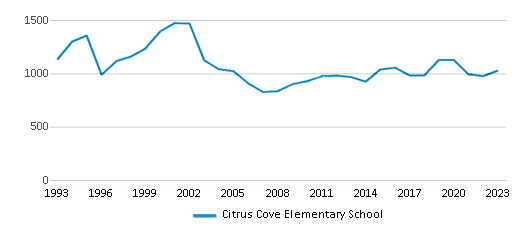
Gender %
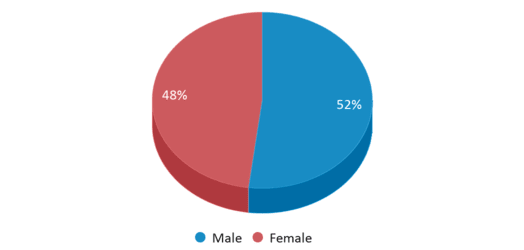
Total Classroom Teachers
66 teachers
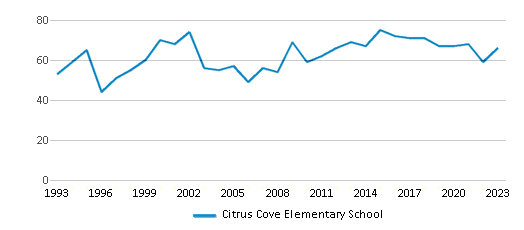
Students by Grade
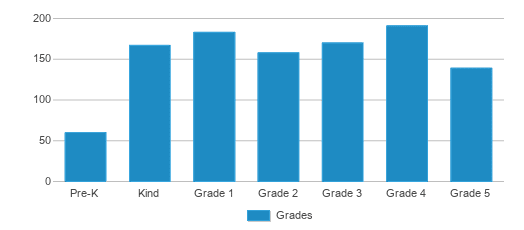
School Calendar
School Rankings
Citrus Cove Elementary School ranks within the top 30% of all 3,704 schools in Florida (based off of combined math and reading proficiency testing data).
The diversity score of Citrus Cove Elementary School is 0.73, which is more than the diversity score at state average of 0.70. The school's diversity has stayed relatively flat over five school years.
Overall Testing Rank
#1108 out of 3704 schools
(Top 30%)
(Top 30%)
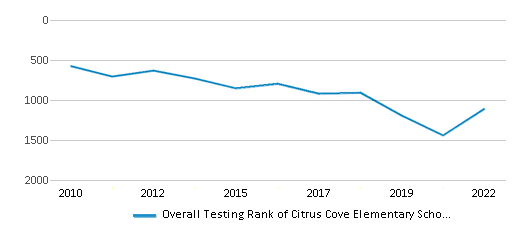
Math Test Scores (% Proficient)
57%
52%
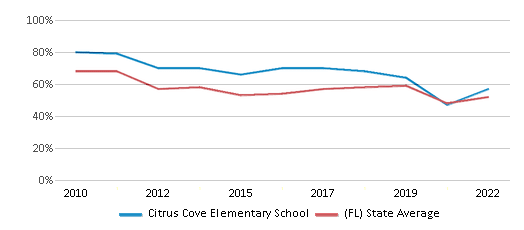
Reading/Language Arts Test Scores (% Proficient)
63%
52%
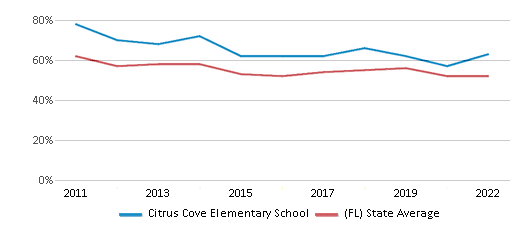
Science Test Scores (% Proficient)
50-54%
52%
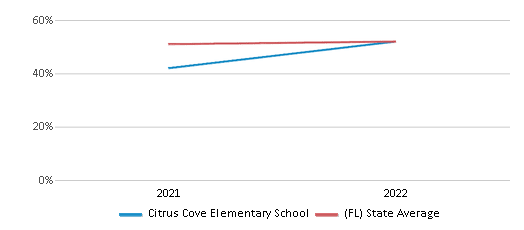
Student : Teacher Ratio
16:1
17:1
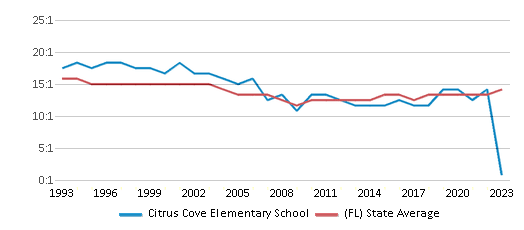
American Indian
n/a
n/a
Asian
5%
3%
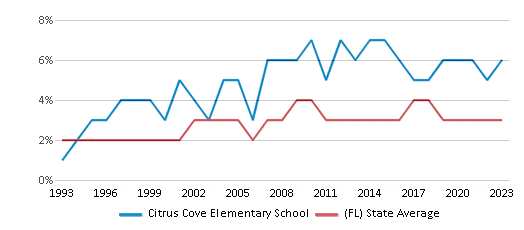
Hispanic
35%
37%
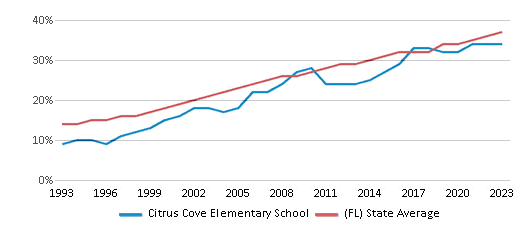
Black
30%
21%
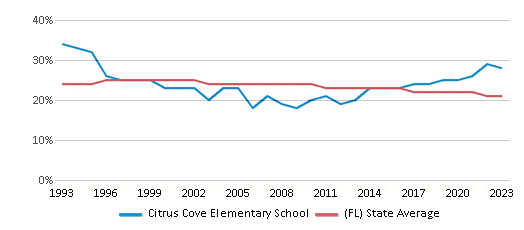
White
25%
35%
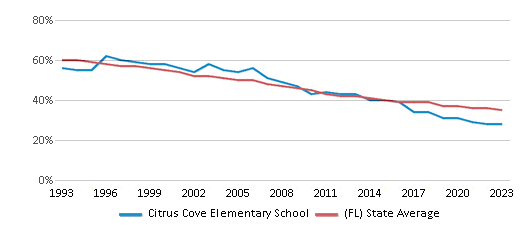
Hawaiian
n/a
n/a
Two or more races
5%
4%
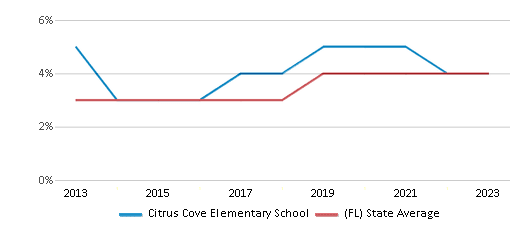
All Ethnic Groups
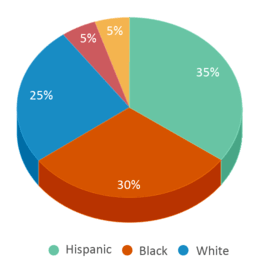
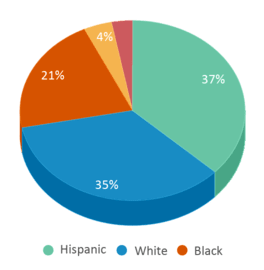
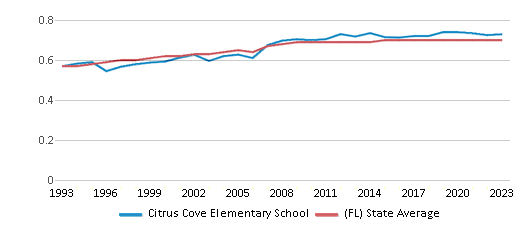
Participates in the National School Lunch Program (NSLP)
Yes
Eligible for Free Lunch
52%
47%
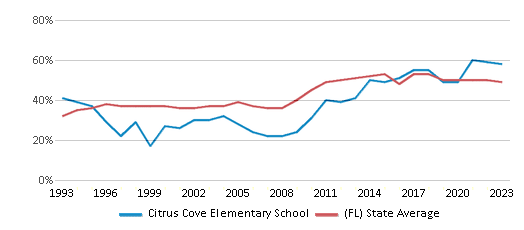
Eligible for Reduced Lunch
5%
4%
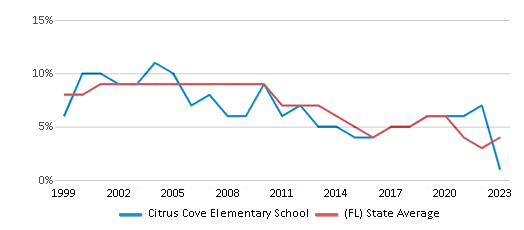
School Statewide Testing
School District Name
Source: National Center for Education Statistics (NCES), FL Dept. of Education
Profile last updated: 02/09/2025
Frequently Asked Questions
What is Citrus Cove Elementary School's ranking?
Citrus Cove Elementary School is ranked #1108 out of 3,704 schools, which ranks it among the top 30% of public schools in Florida.
What schools are Citrus Cove Elementary School often compared to?
Citrus Cove Elementary Schoolis often viewed alongside schools like Freedom Shores Elementary School by visitors of our site.
What percent of students have achieved state testing proficiency in math and reading?
57% of students have achieved math proficiency (compared to the 52% FL state average), while 63% of students have achieved reading proficiency (compared to the 52% FL state average).
How many students attend Citrus Cove Elementary School?
1,068 students attend Citrus Cove Elementary School.
What is the racial composition of the student body?
35% of Citrus Cove Elementary School students are Hispanic, 30% of students are Black, 25% of students are White, 5% of students are Asian, and 5% of students are Two or more races.
What is the student:teacher ratio of Citrus Cove Elementary School?
Citrus Cove Elementary School has a student ration of 16:1, which is lower than the Florida state average of 17:1.
What grades does Citrus Cove Elementary School offer ?
Citrus Cove Elementary School offers enrollment in grades Prekindergarten-5
What school district is Citrus Cove Elementary School part of?
Citrus Cove Elementary School is part of Palm Beach School District.
School Reviews
2 5/16/2016
Academically sound school but they have done from a Parent Friendly atmosphere a couple years ago to a ANTI Parent atmosphere this year. They have implemented a new Afternoon pick up program that is a total nightmare and they decided to do this without any parent input or involvement. As a parent I am very upset. I have to deal with the extra time, extra stress and danger this new pick up procedure puts me in. The additional time waiting for me to be able to pick up my son also stresses my son out. I used to have to arrive at school about a half hour early and would park and walk to greet and hug my child when he came out and today that wait is an hour at least. We are forced to sit in idling cars, many on the main road (Lawrence) for over an hour. This is not time or cost efficient. Wonder if the school board wants to chip in for all the additional fuel we are using for this additional wait time for their idiotic new procedure Wait till some of the parents start taking the board to court over this as well as the thru traffic lane at school becoming (more parking and waiting in line) and being totally blocked. This can't be legal!
Review Citrus Cove Elementary School. Reviews should be a few sentences in length. Please include any comments on:
- Quality of academic programs, teachers, and facilities
- Availability of music, art, sports and other extracurricular activities
Recent Articles

What Is A Charter School?
Explore the world of charter schools in this comprehensive guide. Learn about their history, how they operate, and the pros and cons of this educational innovation. Discover key facts about charter schools, including admission policies, demographics, and funding, as well as what to look for when considering a charter school for your child.

10 Reasons Why High School Sports Benefit Students
Discover the 10 compelling reasons why high school sports are beneficial for students. This comprehensive article explores how athletics enhance academic performance, foster personal growth, and develop crucial life skills. From improved fitness and time management to leadership development and community representation, learn why participating in high school sports can be a game-changer for students' overall success and well-being.

February 05, 2025
Understanding the U.S. Department of Education: Structure, Impact, and EvolutionWe explore how the Department of Education shapes American education, from its cabinet-level leadership to its impact on millions of students, written for general audiences seeking clarity on this vital institution.








